Explore African, the birthplace of coffee
Learn about the best coffee origins in Africa
The treasures of the origin
Africa is the birthplace of coffee. From the forests of East Africa, coffee spread all around the world.
Today the continent is famous for being home to some of the best coffee origins world wide: Yirgacheffe in Ethiopia, Kapchorwa in Uganda, Kivu in the DRC, the hills of Rwanda and Burundi. These are just a few examples.
The region is the home of both Arabica and Robusta. The mineral rich African soil, often volcanic, the high altitudes and a favourable climate, all provide perfect conditions for a variety of rich coffee experiences.
Being based in Uganda, we are perfectly located to source the best coffee Africa can offer.
Join our hunt for the treasures of the origin!
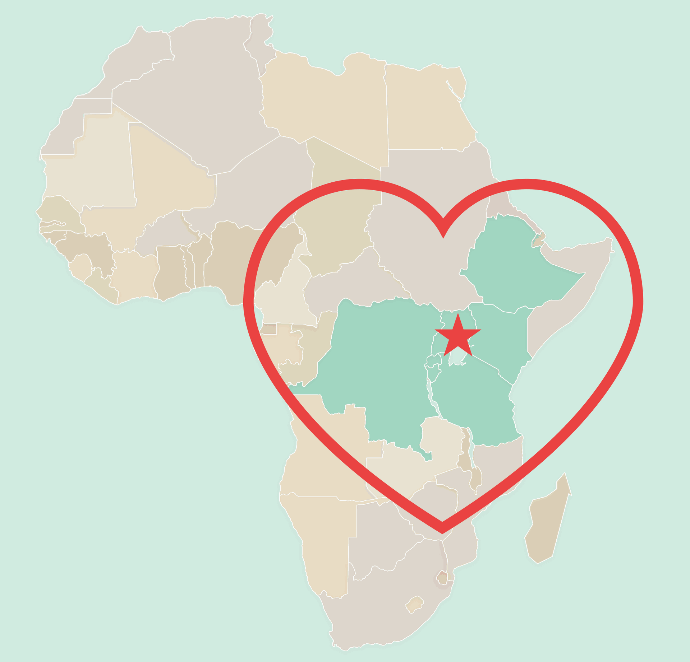
The seven origins
Click the maps to learn more.
Tip: Subscribe to The Supreme to enjoy them all!
Coffee, colonialism and slavery
The history of coffee in three simple steps
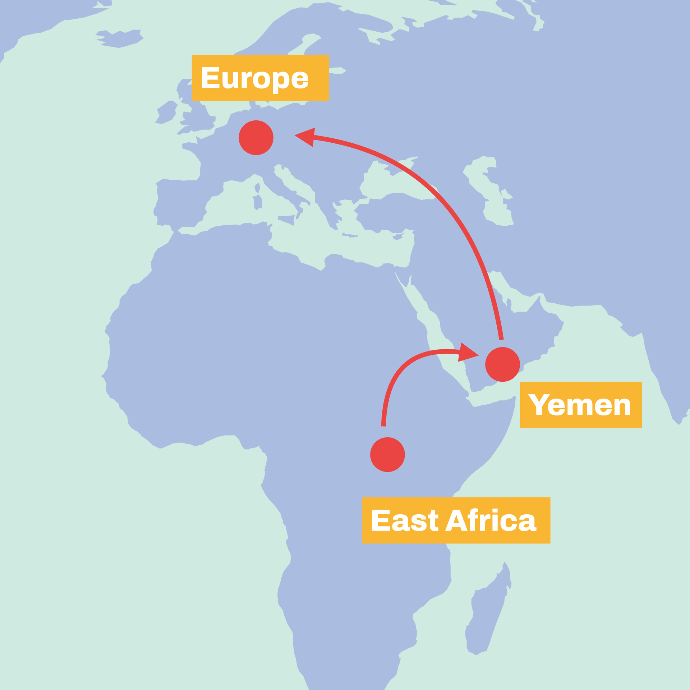
1. From the wild to Europe
Growing wild in the forests of eastern Africa, coffee was taken to Yemen where it first was commercialised. From the port of Mocha, a vibrant trade with Europe emerged.
As coffee was a valuable product, it was strongly protected. But eventually some coffee seeds was stolen and taken to Europe.
From there, the long journey around the globe starts.
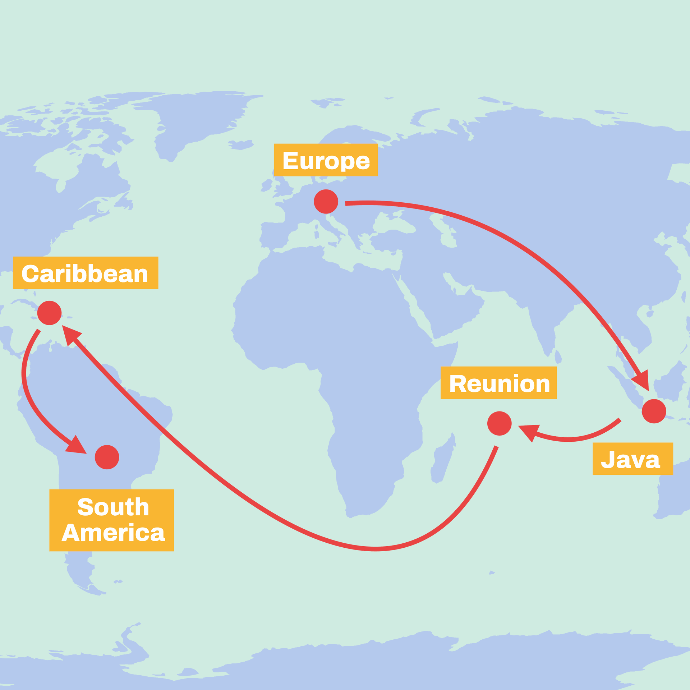
2. The New World
As colonialism spread around the globe, the European colonisers brought the coffee plants along.
The Dutch started plantations on Java and Ceylon, the French and English brought coffee to Central America.
The trade grew, and labour was needed. Slavery became a cheap and effective solution.
Soon, a stolen product was grown by stolen people. All from the same homeland: Africa.
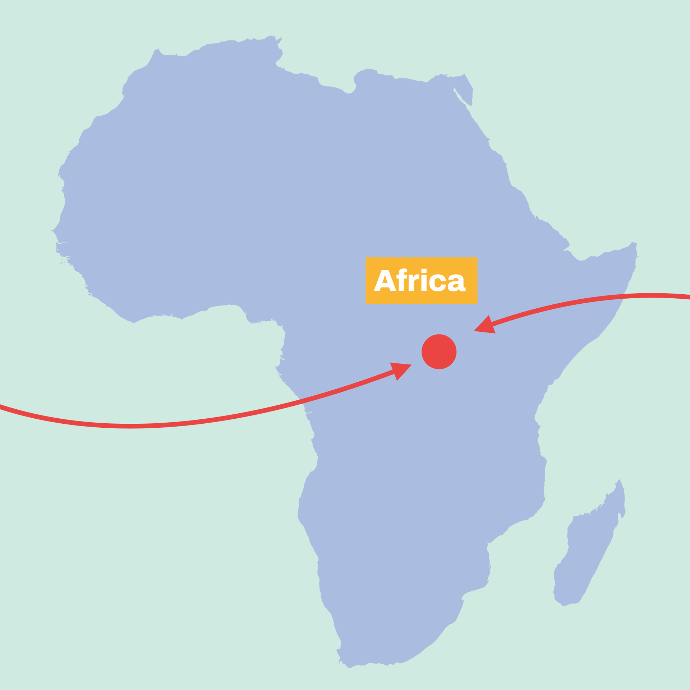
3. Back to Africa
In the 19th century - after decades of slave trade - Africa was the next frontier of colonisation.
The coffee plant, born in the forests of Africa, was finally brought back to its birthplace. Now for commercial production.
The valuable crop was exported to Europe, with limited benefits for the local population.
The coffee industry as we know it today was born.
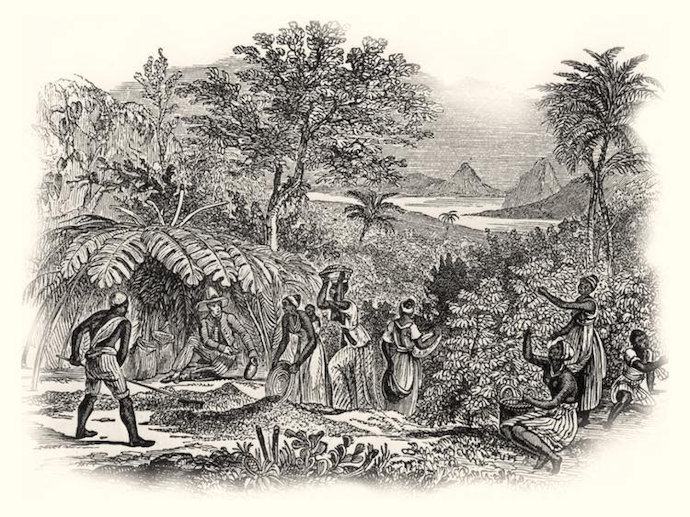
Not much has changed
Colonialism and slavery is fortunately over.
The structures of the colonial age still persist, making the coffee industry one of the most striking examples of systemic global inequality and unfairness.
A lot of money is made by companies far away from where the coffee grows.
While the coffee producers remain poor.
The result?
Every cup of coffee we consume increases global inequality.
The lion's share should go to those who grow the coffee
For coffee to benefit the producing countries, value addition has to be done at source.
No more export of raw materials.

100% African
Directly from the birthplace of coffee
5X More Impact
Where it's needed the most
Detailed Impact Reports
See the precise impact of your coffee consumption
Only The Best
Award winning coffee from the best farmers
The seven coffee origins
Discover what makes them unique
Uganda
The Pearl of Africa
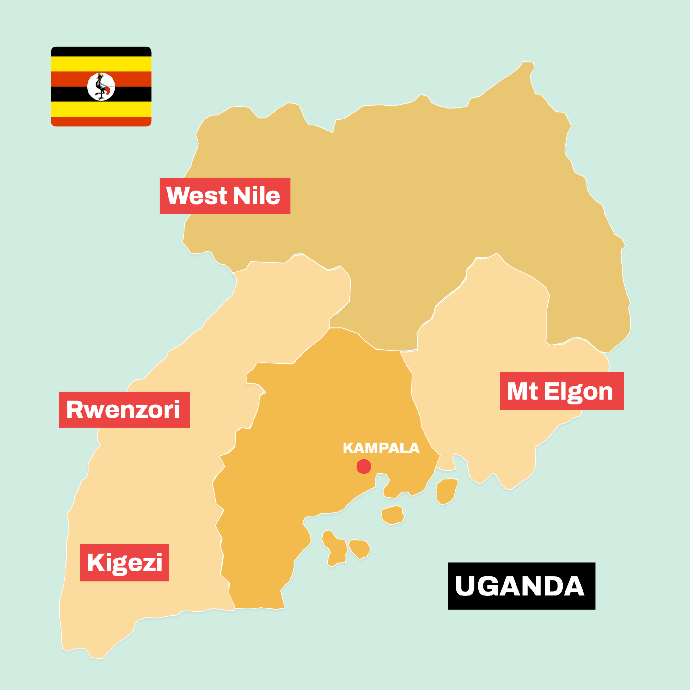
The rising star
An emerald jungle sprinkled with a constellation of rivers and lakes. The source of the mighty river Nile. A green ocean of wavy hills interrupted by golden sheets of savannah where wildlife thrives.
No wonder Winston Churchill gave Uganda the title "The Pearl of Africa".
Uganda is a tropical paradise surrounded by high mountains, where coffee of great quality can be found. Both strong Robusta and mild Arabica varieties are grown here. Typically sweet tasting, with notes of blackberries and a vibrant acidity.
Despite a troubled history of exploitation and wars, today Uganda is rising up as a specialty coffee producer thanks to brilliant farmers that are working on innovative process to get the best from their coffee beans.
The Pearl of Africa is Wild's home base: an ideal location among the best coffee origins of Africa.
Uganda is also one of the least developed nations in the world, making the potential for the impact of our business significant.
Joel Kaburu
A tourist guide who followed his dream and became a passionate coffee farmer, today Joel is one of the most ambitious farmers on Mt Elgon.
His little farm is a hub to test new ways to process coffee. Honey processed, aerobic and anaerobic fermentation etc: coffee processing has no secret for Joel.
Olive Kishero
Olive is one of the most experienced and passionate coffee farmers on Mt Elgon.
Growing up on a coffee farm, learning all about coffee as a child, Olive's coffee is just like her: a reliable and vibrant products, the result of years of improvement, expertise and heritage.
Biira and Efraim
A love story involving this wonderful couple and their coffee farm. Biira and Efraim put a lot of devotion and passion into growing their coffee.
The result is a wonderful natural processed Arabica that brings the notes of the mineral rich soil of the Rwenzoris; "The mountains of the moon".
Burundi
The Heart of Africa
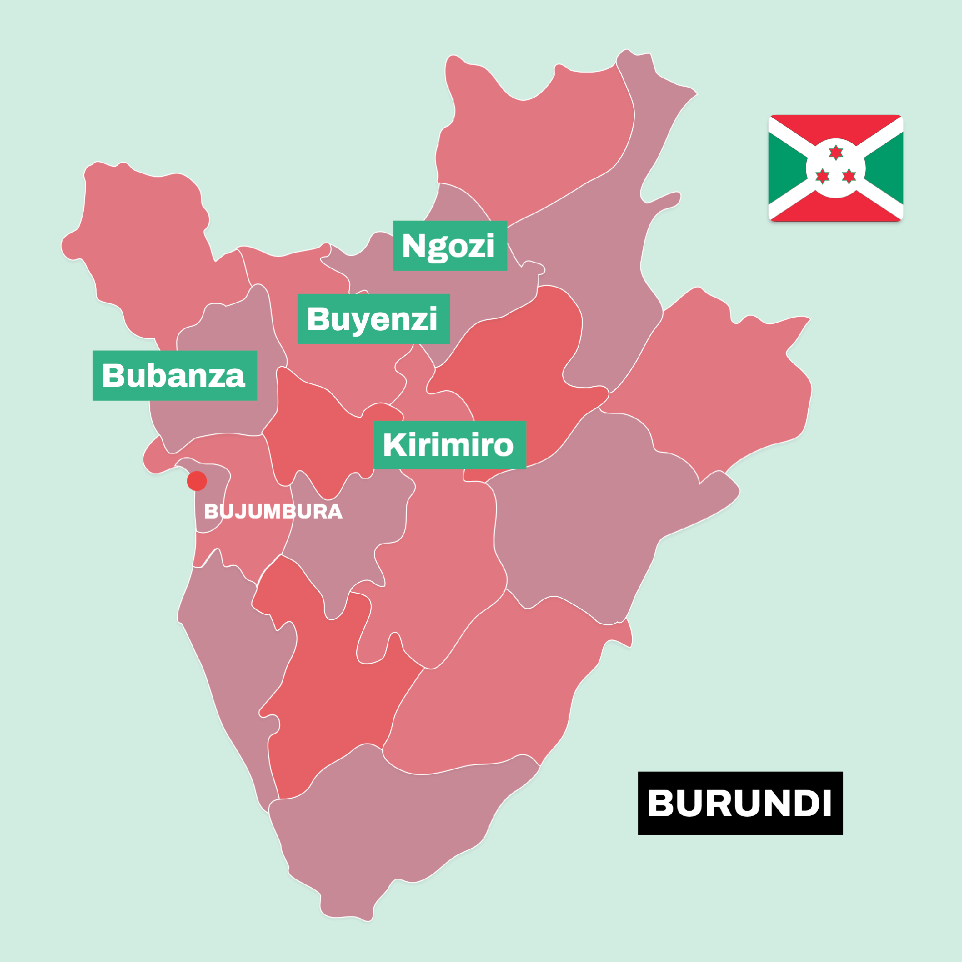
Great coffee. Great poverty.
With the shape of a heart, and a location in the geographical centre of the continent, Burundi really is the heart of Africa.
Burundi shows better than any other country the effects of the colonial structures of the coffee industry. Despite tea and coffee contributing 90% of their export income, almost all Burundians live in poverty: Burundi is one of the poorest countries in the world, with a GDP per capita of around $300.
This is incredible considering Burundi has perfect conditions for growing superb coffee - mainly Bourbon Arabica.
With such nice coffee, dominated by fruity and juicy berry notes, carefully processed using the washing method, the income should be way higher. But the farmers are at the mercy of the rules and prices of the international coffee market.
The only hope for the 650.000 families depending on coffee farming for survival is to find buyers who will let them enjoy a larger share of the value potential of their coffee.
Burundi coffee hunt
Imagine having grown coffee for your life, but never tasted coffee.
See what happened when we served the coffee farmers their own coffee, having them tasting it for the very first time.
Democratic Republic of Congo
The Mighty Forest of Africa
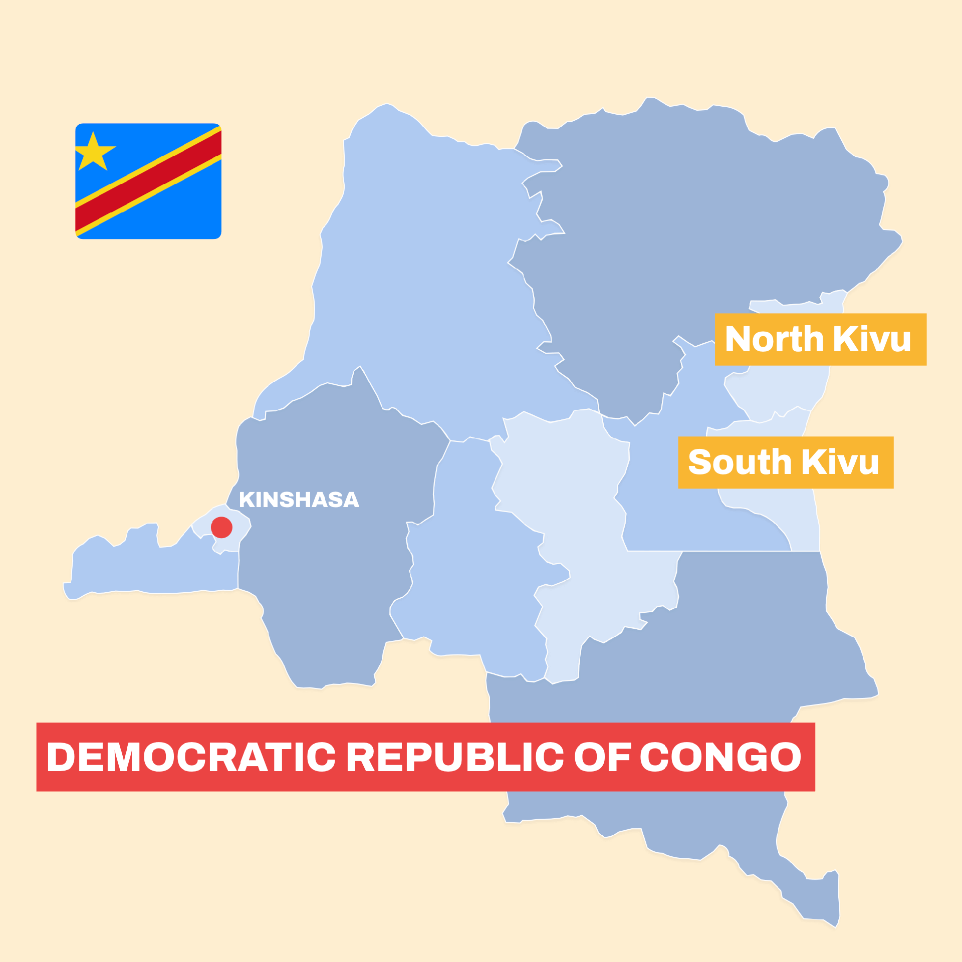
Also known as The Heart of Darkness
Few countries have suffered as violently from colonisation as DR Congo. As the private colony of King Leopold of Belgium, unspeakable horrors took place. Still today, the country is suffering the consequences of this exploitation.
Under the Belgian rule the industry was organised in big plantations where large quantities of poor quality coffee were grown for export. The local population were often exploited, basically employed as slaves, struggling to survive.
Paradoxally, when the colonialist left, the situation got even worse: the whole coffee industry collapsed as the country was left without expertise and resources.
With time, family owned farms and small cooperatives has been organised, rebuilding the coffee industry from the ashes.
Today, even if the political situation is still far from stable, DR Congo is one of the most promising countries for quality specialty coffee, thanks to the unique geography and the rich volcanic soil that gives the cup a rich body and sweet fruity notes.
The Sangara Brothers
Three enterprising brothers followed in the footsteps of their father and continued the legacy of coffee farming.
Their juicy Arabica cherries, grown in the rich volcanic soil on the shore of Lake Kivu, are skilfully processed to become world class coffee.
Monsieur Lwaboshi
Monsieur Lwaboshi was the winner of the Saveur De Kivu competition in 2019. His coffee scored an incredible 92.3 points!
In addition to his amazing Lake Kivu Bourbon coffee, he his the proud father of 22 children.
Ethiopia
The Origin
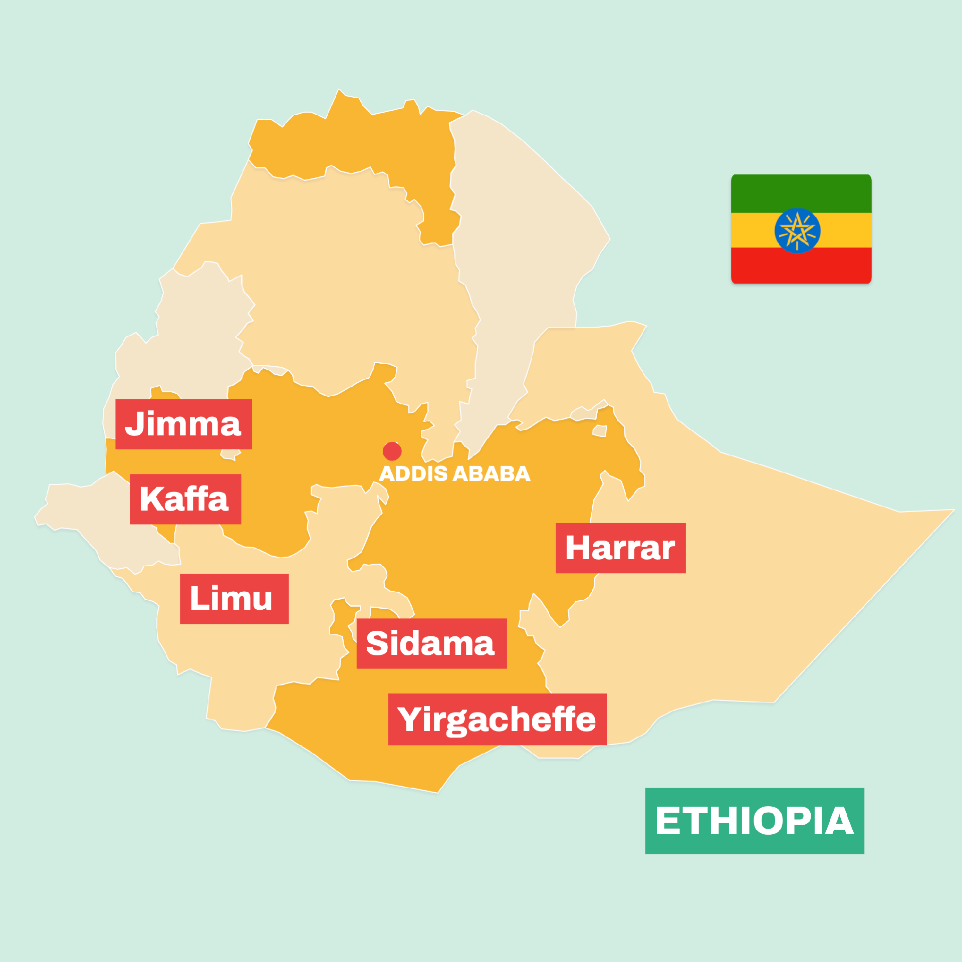
Where the goats gave the gift to mankind
Though hard to pin down exactly, Ethiopia is widely recognised as the birthplace of coffee.
According to legend, it was here that the shepherd Kaldi, with the help of his goats, first discovered the potential of these beloved beans.
The Ethiopian coffee regions are famous all over the world: Harrar, Yirgacheffe, Sidama - producing coffees characterised by rich, uncommon and complex notes of citrus, flowers and fruits.
Ethiopia is one of the few African countries where coffee production and consumption are equally important. Because of this, coffee is their primary national sector. Everything is strictly organised and regulated, which unfortunately often translates into excess red tape and low traceability.
It can therefore be challenging to find traceable single origin coffee showing the farmers behind the coffee. Though progress is being made to improve this.
Kenya
From the mountain slopes above the savannah
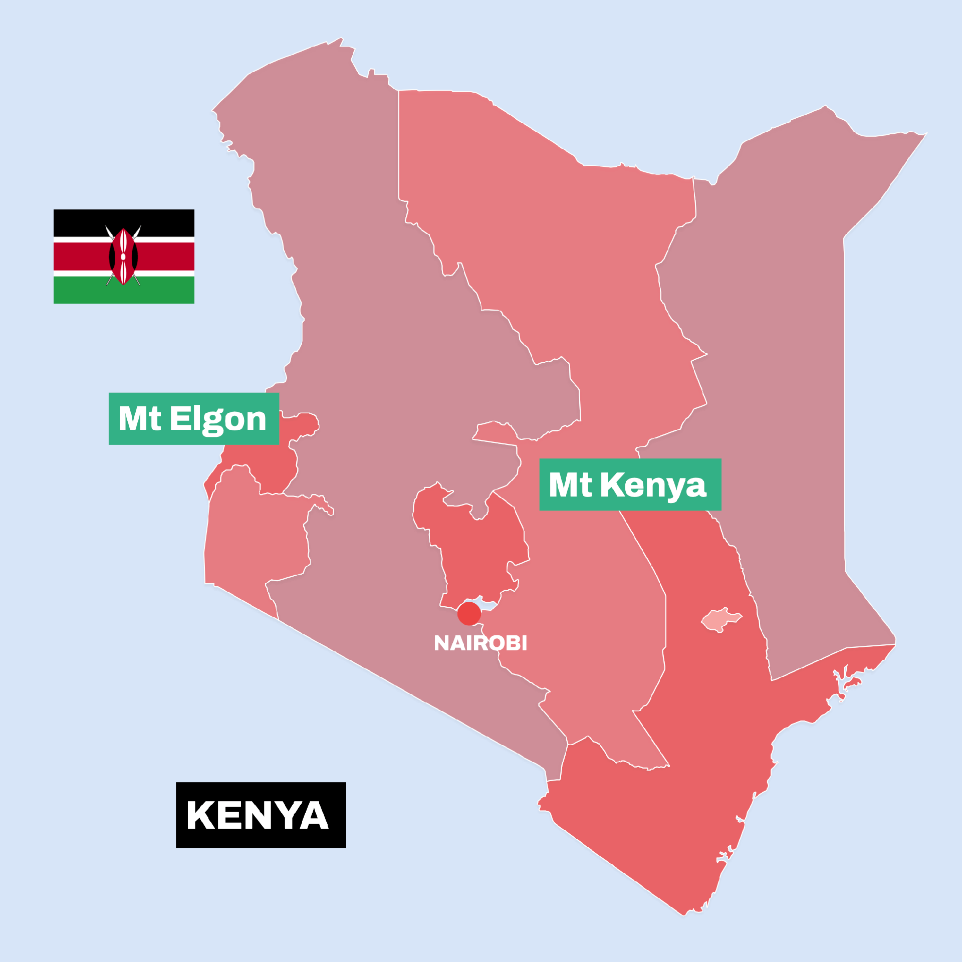
A detour around the world
When you think of Africa, you are probably imagining Kenya: a wide golden savannah teeming with wildlife at the slopes of majestic mountains such as Mount Kenya, or the most famous one: Kilimanjaro, at the border with Tanzania.
Maybe seconds only to Ethiopian one in terms of fame, Kenyan coffee is renowned among experts for its unique characteristics, usually having rich aromas, a strong body and a marked acidity with undertones of blackcurrant.
Although very close to the origin of coffee, coffee farming started relatively late in Kenya. It took 500 years to arrive from Ethiopia - what a weird detour it made traveling all around the world!
As for many others African countries the industry was organised to maximise the coloniser's profit. Until independence the wealthy Europeans banned the locals from growing coffee.
Rwanda
The land of a thousand hills
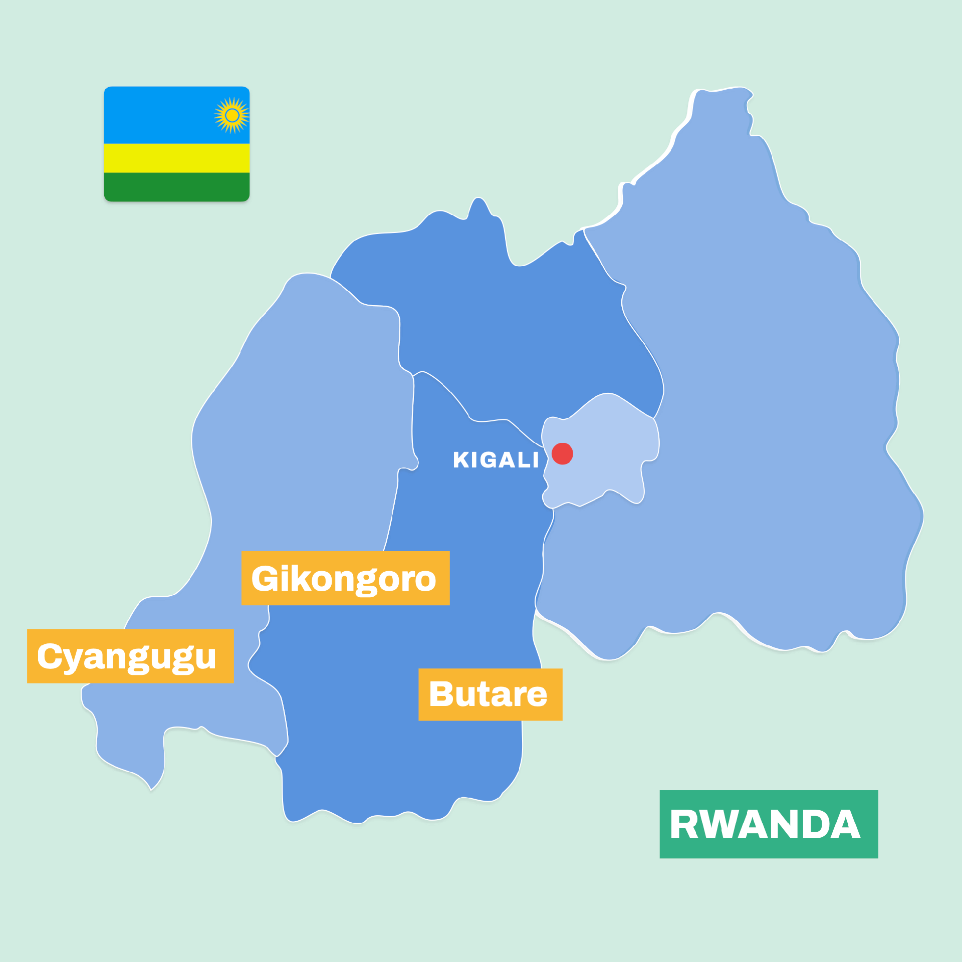
Redemption coffee
With an average altitude of 1,598 m (5,243 ft), rich volcanic soil, abundant rainfall forming thousand of steams running down the endless rolling hills, and an all year long mild weather, Rwanda has perfect conditions for growing rich, complex tasting coffee.
But it hasn't always been like this: under colonial rule export was monopolised by the Europeans and no incentive was given to produce more than average quality coffee in large quantities.
After the horrors of the 1994 genocide, coffee became a symbol of redemption for Rwanda.
The first washing station was build in 2004, and today there are more than 300 around the country.
Expert processing makes the difference in terms of complexity: their rich washed Arabica can offers a fresh bouquet of fruity notes, which tends to apple and grapes. Flowery notes are also common thanks to the altitude.
Rwandan coffee hunt
We went to find the best Rwandan coffee.
We found not only proud farmers making amazing coffee, but a country showing impressive recovery and positive development.
Tanzania
Under the big mountain
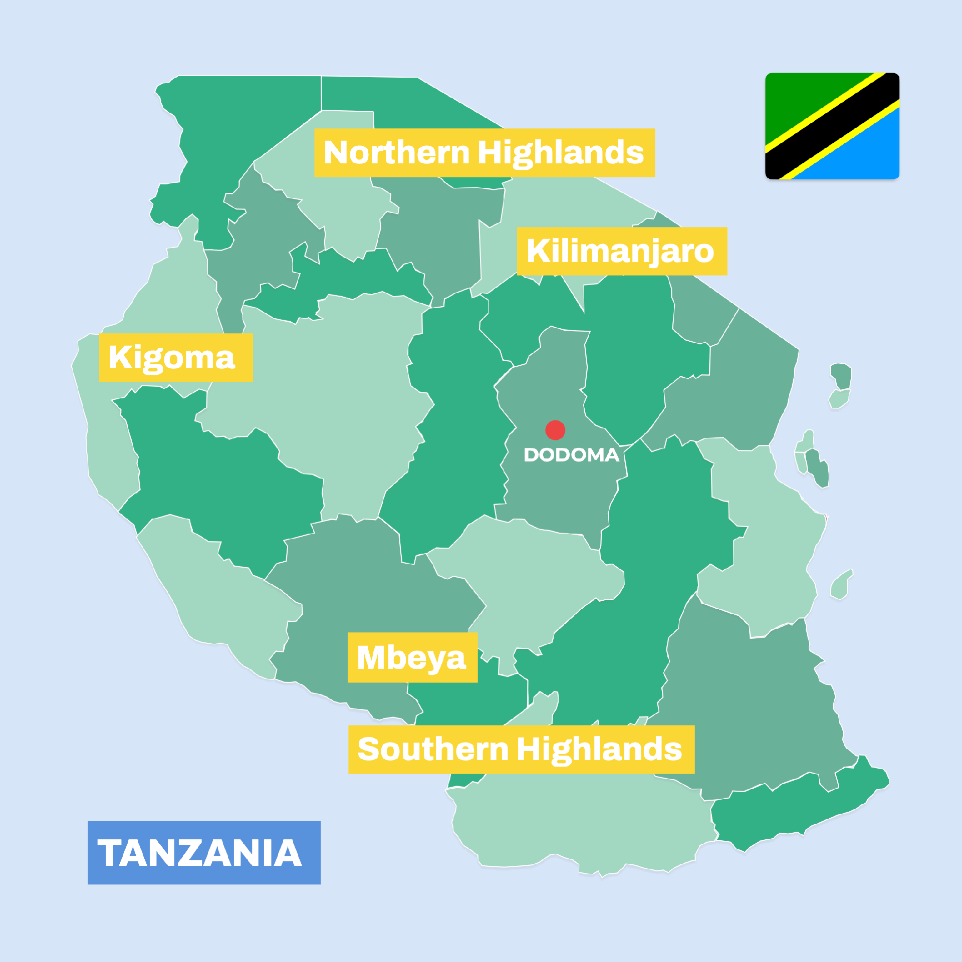
Ancient traditions
According to oral tradition, coffee arrived in Tanzania from Ethiopia in the 16th century, introduced by the Haya people, who used to chew the smoked berries instead of drinking it.
Coffee faming was done differently compared to colonial wishes, so when the Germans and later the English tried to impose large estate coffee farming in Tanzania, they encountered resistance.
Today, Tanzania produces around 70% Arabica and 30% Robusta, but still struggle to reach the quantities of its neighbouring countries.
Still, Tanzanian coffee is very interesting, with marked acidity and typical fruity notes that tends to red berries.






